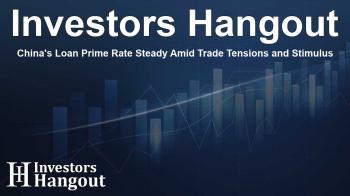China's Loan Prime Rate Steady Amid Trade Tensions and Stimulus

China's Loan Prime Rate Remains Stable
The People’s Bank of China (PBOC) made the decision to keep its benchmark loan prime rate unchanged recently. This move comes as China braces for potential changes in the economic landscape due to incoming U.S. leadership, particularly focusing on the trade policies proposed by President-elect Donald Trump.
Current Loan Prime Rates
The one-year loan prime rate is set at 3.1%, and the five-year loan prime rate, which influences mortgage rates, stands at 3.60%. This decision was broadly anticipated by financial markets, keeping both rates at their historically low levels determined by the PBOC.
Influence of the Yuan
The PBOC's ability to lower interest rates further appears limited given the recent decline of the yuan, which has been trading at near its lowest points since late 2023. The currency's performance reflects broader economic pressures that the Chinese economy is currently facing.
Potential for Future Rate Cuts
Despite the current hold on rates, many analysts predict that interest rates may decrease later this year. The PBOC is expected to implement more aggressive stimulus measures to counteract possible negative impacts from increased U.S. trade barriers.
Fiscal Stimulus Expectations
The focus for the Chinese government will be on fiscal stimulus plans that aim to boost personal spending and support the real estate sector. These targeted measures are vital for maintaining economic momentum despite external pressures.
Trade Tensions Ahead
Trump’s administration has signaled intentions to impose high tariffs on Chinese imports, proposing duties that could reach as much as 60%. This development raises concerns over the impact on China’s export-dependent economy.
Economic Growth Amid Challenges
Recent economic data illustrates a pick-up in Chinese growth during the fourth quarter of 2024, partly fueled by the government’s earlier stimulus initiatives. This shows that while challenges are present, there are also signs of resilience within the economy.
Frequently Asked Questions
What is the current loan prime rate in China?
The one-year loan prime rate is currently at 3.1%, while the five-year rate is at 3.60%.
Why did China keep its loan prime rate unchanged?
China maintained its loan prime rate to assess the economic effects of anticipated U.S. trade policies under President-elect Trump.
How does the loan prime rate affect the economy?
The loan prime rate serves as a benchmark for lending rates, influencing loans and mortgages, which in turn affects overall economic activity.
What stimulus measures is China expected to implement?
The Chinese government is expected to introduce targeted fiscal measures aimed at boosting consumer spending and supporting sectors like real estate.
How has the yuan's performance affected Chinese economic policy?
The weakening of the yuan limits the PBOC's options for aggressive rate cuts, prompting more careful monetary policy planning.
About Investors Hangout
Investors Hangout is a leading online stock forum for financial discussion and learning, offering a wide range of free tools and resources. It draws in traders of all levels, who exchange market knowledge, investigate trading tactics, and keep an eye on industry developments in real time. Featuring financial articles, stock message boards, quotes, charts, company profiles, and live news updates. Through cooperative learning and a wealth of informational resources, it helps users from novices creating their first portfolios to experts honing their techniques. Join Investors Hangout today: https://investorshangout.com/
Disclaimer: The content of this article is solely for general informational purposes only; it does not represent legal, financial, or investment advice. Investors Hangout does not offer financial advice; the author is not a licensed financial advisor. Consult a qualified advisor before making any financial or investment decisions based on this article. The author's interpretation of publicly available data presented here; as a result, they should not be taken as advice to purchase, sell, or hold any securities mentioned or any other investments. If any of the material offered here is inaccurate, please contact us for corrections.
